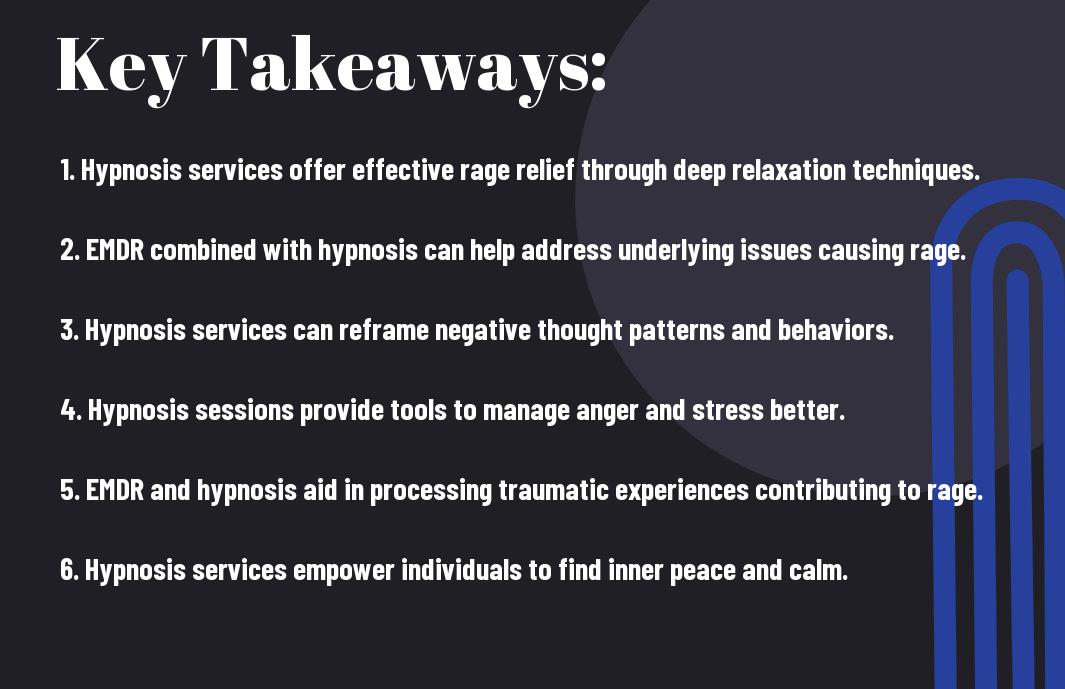Advanced Hypnosis services and EMDR for the relief of rage
Relief from uncontrollable rage can be found through advanced hypnosis and Eye Movement Desensitization and Reprocessing (EMDR) therapy. These powerful therapeutic techniques have been proven to effectively address deep-seated emotional triggers that can lead to outbursts of anger. Hypnosis services combined with EMDR offer a multi-faceted approach to help individuals process and manage their rage healthily and sustainably.
Key Takeaways:
- Hypnosis Services: Hypnosis can be an effective tool for managing and relieving feelings of rage.
- Targeted Approach: Combining hypnosis with EMDR therapy offers a targeted approach to addressing the root causes of rage.
- Emotional Regulation: Hypnosis and EMDR can help individuals develop better emotional regulation skills, leading to fewer outbursts of rage.
- Healing Trauma: EMDR therapy can assist in processing traumatic experiences that may contribute to rage reactions.
- Long-Term Results: By addressing underlying issues through hypnosis and EMDR, individuals can experience long-term relief from rage and its associated symptoms.
The Science of Hypnosis
Is EMDR a type of hypnotherapy, and is it just as effective?
History and Evolution of Hypnotism
An understanding of hypnosis dates back centuries, with roots in ancient practices like meditation, mesmerism, and trance states. The modern concept of hypnosis began to take shape in the 18th century when Franz Mesmer, a physician, developed a theory of “animal magnetism” that laid the foundation for hypnotherapy as we know it today.
Mechanisms Behind Hypnotic States
One of the most widely accepted theories on the mechanisms behind hypnotic states is the idea that hypnosis alters brain activity and can influence perception, behaviour, and physiological responses. This altered state of consciousness allows for heightened suggestibility, increased focus, and a deep sense of relaxation.
For instance, research has shown that during hypnosis, the brain enters a state of focused attention where the individual is more receptive to positive suggestions. This can lead to profound changes in perceptions, beliefs, and behaviours, making hypnosis a powerful tool for addressing a wide range of emotional and psychological issues.
Hypnosis in the Treatment of Emotional Distress
Treatment with hypnosis services has shown great promise in alleviating emotional distress, including anxiety, depression, trauma, and anger issues. Hypnotic techniques have been used to help individuals process and reframe traumatic memories, alleviate stress and anxiety, and develop healthier coping mechanisms. The positive effects of hypnosis on emotional well-being can be long-lasting and transformative.
The Fundamentals of EMDR
Unlike traditional talk therapy, Eye Movement Desensitization and Reprocessing (EMDR) is a specialized psychotherapy approach that helps individuals process past traumatic experiences more efficiently and effectively. EMDR incorporates bilateral stimulation, such as eye movements or taps, to help clients reprocess distressing memories and reduce the emotional charge associated with them.
Genesis of Eye Movement Desensitization and Reprocessing (EMDR)
Genesis: Developed by psychologist Francine Shapiro in the late 1980s, EMDR was initially designed to treat symptoms of post-traumatic stress disorder (PTSD). Shapiro discovered that when she moved her eyes rapidly from side to side while thinking about a disturbing memory, the intensity of the negative emotions associated with that memory decreased.
Principles of Bilateral Stimulation
Principles: Bilateral stimulation is a key component of EMDR therapy. This process involves stimulating both sides of the brain to enhance the processing of distressing memories and promote adaptive resolution. The rhythmic left-right stimulation mimics the natural processing that occurs during REM sleep, allowing the brain to reprocess traumatic memories and integrate them more adaptively.
Movement: Repeated bilateral stimulation helps clients access and process traumatic memories more effectively, allowing for the reprocessing of these memories on a neurological level. This helps individuals desensitize the emotional charge associated with the memories and create new, more positive associations.

Advanced Hypnotherapy Strategies for Rage Relief
- Techniques for Inducing Hypnosis
Progressive Muscle Relaxation Visualization and Imagery By systematically tensing and relaxing muscles, individuals can achieve a deep state of relaxation. Guiding the individual to imagine calming scenes or experiences to facilitate relaxation. - Strategies for Rage Management through Hypnosis
Anchoring Techniques Reframing Negative Thoughts Creating a positive trigger to elicit a calm state when feeling overwhelmed by rage. Helping individuals reinterpret situations that trigger rage in a more constructive light.
Techniques for Inducing Hypnosis
Hypnotherapy offers various techniques to induce a trance state, where the individual is highly receptive to suggestions. Progressive Muscle Relaxation involves tensing and relaxing different muscle groups, promoting deep relaxation. Visualization and Imagery guide individuals to imagine peaceful settings, aiding in achieving a state of calmness and receptiveness.
Strategies for Rage Management through Hypnosis
Rage can be effectively managed through hypnosis by utilizing techniques such as Anchoring, where a calming trigger is established to counteract rage responses, and Reframing Negative Thoughts, which helps individuals reframe their perspective on triggering situations, leading to reduced rage responses.
To effectively manage rage through hypnosis, it is crucial to work with a skilled hypnotherapist who can tailor interventions to the individual’s specific needs and triggers. By incorporating techniques like Anchoring and Reframing Negative Thoughts, individuals can experience significant relief from rage episodes and develop healthier coping mechanisms.
Enhancing Self-Regulation and Emotional Control
To enhance self-regulation and emotional control through hypnosis, hypnotherapists use a combination of relaxation techniques and cognitive restructuring. These methods help individuals regulate their emotions, manage anger triggers effectively, and develop better coping strategies for dealing with intense feelings of rage.
Inducing a state of deep relaxation and heightened suggestibility through hypnosis allows individuals to access their subconscious mind and reframe negative thought patterns associated with rage. By addressing the root causes of anger and implementing positive suggestions during hypnosis sessions, individuals can achieve long-term relief from uncontrollable rage outbursts.
EMDR Techniques Specific to Rage Issues
Assessment and Preparation for EMDR
Many individuals seeking EMDR therapy for rage issues will first undergo an assessment to identify specific triggers, memories, and patterns related to their anger. This assessment helps the therapist tailor the EMDR treatment plan to address the root causes of the rage. Additionally, preparation for EMDR may involve teaching the client calming techniques and coping strategies to manage intense emotions that may arise during the therapy sessions.
Targeting Rage Memories with EMDR
EMDR therapy utilizes a structured approach to target and reprocess memories that contribute to rage issues. By focusing on specific memories associated with anger, the therapist helps the client identify and challenge negative beliefs and emotions linked to these past experiences. Through bilateral stimulation, such as eye movements or taps, EMDR helps desensitize the emotional charge attached to these memories, leading to decreased reactivity and more adaptive responses to triggers.
With EMDR, clients can experience significant relief from intense rage by processing and reprocessing distressing memories in a safe and controlled environment. The therapy allows individuals to explore and reframe their perception of past events, leading to a reduction in anger symptoms and improved emotional regulation.
Incorporating EMDR into a Comprehensive Treatment Plan
To address rage issues comprehensively, EMDR can be integrated into a broader treatment plan that may include other therapeutic modalities such as cognitive-behavioural therapy (CBT), mindfulness practices, and relaxation techniques. By combining EMDR with other evidence-based interventions, individuals can experience a more holistic approach to managing and reducing anger.
Comprehensive treatment plans that include EMDR as a core component have shown great success in helping individuals gain control over their anger, improve interpersonal relationships, and enhance overall well-being. By targeting rage memories with EMDR and incorporating them into a comprehensive treatment plan, individuals can experience lasting relief and empowerment in managing their rage issues.
Integration of Advanced Hypnosis and EMDR
Once again, the integration of advanced hypnosis and Eye Movement Desensitization and Reprocessing (EMDR) can offer a powerful combination for managing rage. By combining these two therapeutic approaches, individuals can experience a comprehensive treatment plan that addresses deep-rooted emotional issues and traumatic memories.
-
- Complementary Use of Hypnosis and EMDR
| Hypnosis Services | EMDR Therapy |
| Hypnosis can help access unconscious emotions. | EMDR can reprocess traumatic memories. |
| Hypnosis can assist in uncovering hidden triggers for rage. | EMDR can desensitize emotional responses. |
| Hypnosis can promote relaxation and stress relief. | EMDR can facilitate the adaptive processing of distressing memories. |
Complementary Use of Hypnosis and EMDR
-
- On the other hand, EMDR therapy can aid in reprocessing traumatic memories associated with past experiences of anger, allowing individuals to desensitize their emotional responses and develop healthier coping strategies.
- An integrated approach of advanced hypnosis and EMDR offers a unique set of benefits for individuals struggling with rage.
-
- Hypnosis can help uncover unconscious emotions and hidden triggers that may contribute to explosive outbursts of anger. By accessing the deeper layers of the mind, hypnosis can assist individuals in recognizing and addressing unresolved issues that fuel their rage.
Developing a Sequential Approach for Rage Relief
-
- One effective strategy for rage relief is to develop a sequential approach that combines the benefits of hypnosis and EMDR therapy. By establishing a structured treatment plan that integrates these two modalities, individuals can experience a more comprehensive and targeted intervention for managing their anger issues.
-
- This sequential approach can involve utilizing hypnosis to identify underlying triggers for rage and then integrating EMDR therapy to reprocess associated traumatic memories and alleviate emotional distress. Advanced approaches to rage relief involve the strategic coordination and planning of treatment using hypnosis services and EMDR therapy.
-
- By carefully mapping out a personalized treatment plan that incorporates these two modalities, individuals can receive tailored interventions that address the specific factors contributing to their rage.
-
- The collaboration between hypnosis and EMDR can offer a holistic approach to anger management, focusing on both the underlying emotional triggers and the traumatic memories that fuel destructive behaviours. The integration of these advanced techniques allows for a more comprehensive and effective treatment strategy, ultimately leading to long-lasting relief and emotional healing.
Obstacles and Considerations in Treatment
Addressing Common Misconceptions and Fears
For individuals considering advanced hypnosis and EMDR for rage relief, it’s vital to address common misconceptions and fears that may arise. Any concerns about losing control or revealing sensitive information involuntarily can be alleviated by understanding that hypnosis is a collaborative process. Therapists work with clients to create a safe environment where they remain in control and can stop the session at any time.
Understanding and Overcoming Resistance to Therapy
With any form of therapy, resistance can be encountered. Some individuals may fear delving into painful memories or subconscious thoughts, leading them to put up barriers. However, therapists trained in advanced techniques like hypnosis and EMDR can help clients navigate these challenges by building trust, establishing rapport, and ensuring that the pace of therapy feels comfortable and empowering.
Obstacles in therapy can often serve as opportunities for growth and breakthroughs in healing. Understanding and acknowledging resistance is a crucial step in the therapeutic process.
Ethical and Practical Issues in Delivering Advanced Therapies
To ensure the ethical and practical delivery of advanced therapies like hypnosis and EMDR, therapists must navigate various considerations. Here are some key points to keep in mind:
-
-
- Confidentiality: Protecting client privacy and confidentiality is paramount in all therapeutic settings.
- Scope of Practice: Therapists should operate within their scope of practice and only use techniques they are trained and qualified to perform.
-
Another vital aspect to consider is the importance of ongoing training and professional development for therapists offering advanced therapies. Staying updated on the latest research and best practices ensures the highest quality of care for clients seeking relief from rage and other emotional challenges.

Future Directions and Continuing Education
Despite the advancements in hypnosis and EMDR for rage relief, there are ongoing research trends that are shaping the future of these therapies. Professionals in the field are continually exploring new techniques and approaches to better help individuals struggling with anger management issues.
Research Trends in Advanced Therapies for Rage
-
- Neuroscientific Integration:
| Research: | New studies are focusing on the neurological effects of hypnosis and EMDR on anger regulation mechanisms. |
-
- Cross-Cultural Applications:
| Research: | Exploring how hypnosis services can be tailored to suit different cultural backgrounds for more effective rage management. |
Opportunities for Professional Development in Hypnosis and EMDR
One of the key opportunities for professionals in the field of hypnosis and EMDR is ongoing education and training. Continual learning allows therapists to stay updated on the latest techniques and research findings, enhancing their ability to provide effective hypnosis services for individuals struggling with rage.
Professional development also includes attending conferences, workshops, and seminars focused on anger management and advanced therapeutic approaches. Engaging in peer supervision and seeking mentorship from experienced practitioners can further enhance a therapist’s skills in helping clients effectively manage their anger issues.

To wrap up
Taking this into account, advanced hypnosis and EMDR therapy have proven to be effective tools in managing and relieving intense feelings of rage. By tapping into the subconscious mind and addressing underlying triggers and traumas, individuals can experience significant relief and improvement in their emotional regulation. Hypnosis services, when used in combination with EMDR, offer a comprehensive approach to addressing deep-rooted issues and promoting long-term healing.

Through the guidance of skilled therapists and their expertise in hypnosis services, individuals can gain better insight into their emotions, learn healthy coping mechanisms, and ultimately achieve a sense of empowerment and control over their rage. By incorporating these evidence-based techniques into their therapeutic journey, individuals can experience lasting changes in their emotional well-being and quality of life.
FAQ
Q: What are the benefits of hypnosis services for rage relief?
A: Hypnosis services can help individuals access their unconscious mind to address underlying issues causing rage and learn coping mechanisms to manage emotions effectively.
Q: How does hypnosis help in relieving rage?
A: Hypnosis can assist individuals in achieving a state of deep relaxation, where they are more receptive to suggestions for positive behavioural changes and stress reduction, leading to better anger management.
Q: What is EMDR and how does it complement hypnosis for rage relief?
A: Eye Movement Desensitization and Reprocessing (EMDR) is a psychotherapy approach that helps individuals process traumatic memories. When combined with hypnosis, EMDR can address deep-rooted issues contributing to rage and facilitate healing.
Can hypnosis services help in managing anger triggers?
A: Yes, hypnosis services can assist individuals in identifying anger triggers, reframing negative thought patterns, and developing healthier ways to respond to situations that typically lead to rage outbursts.
Are hypnosis services and EMDR safe for rage relief?
A: When conducted by trained professionals, hypnosis services and EMDR are safe and non-invasive approaches that can help individuals effectively manage and alleviate rage, promoting emotional well-being and overall mental health.
The Official Instagram profile of Mind Spirit Body Hypnosis services.
About the author: Award-winning Fanis Makrigiannis of Mind Spirit Body Hypnosis therapy is a certified Hypnotherapist and Master Practitioner of Neuro-linguistic Programming with the American Board of Hypnotherapy. Proudly serving Durham Region, The Greater Toronto Area, Peel Region, Ontario, Canada, and the United States of America via Zoom meetings.




